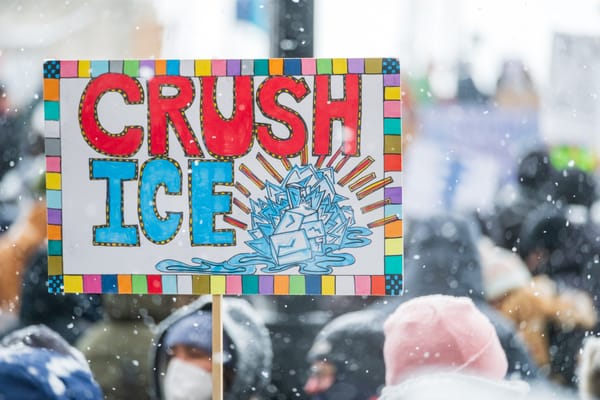Must-Reads and Some Thoughts on the FBI
We must prepare ourselves and our communities for the escalating threats we face.


Must-Reads
From the importance of anti-suicide interventions to worker-led efforts to resist Trump’s edicts, here are some of the most important articles I’ve read this week.
- Trump’s Executive Orders Build Toward Dictatorial “Unitary Executive” Power by C.J. Polychroniou. “David M. Driesen, university professor at Syracuse University College of Law, says that Trump’s executive order to curb the authority of independent agencies is illegal and that the president is using unitary executive theory to establish a dictatorship.”
- Musk Ally Demands Admin Access to System That Lets Government Text the Public by Jason Koebler. “A worker at the General Services Administration told colleagues in a Slack message Tuesday that they have resigned in protest after Elon Musk ally Thomas Shedd requested ‘admin/root access to all components of the Notify.gov system,’ which is a government system used to send mass text messages to the public that contains information the worker said is highly sensitive and would give Shedd unilateral, private access to the personal data of members of the public.”
- Trump and Musk Keep Spouting Bogus Numbers to Hide Their Real Agenda by Ross Rosenfeld. “In a sense, the truth doesn’t matter—because by the time the debunking is done, the damage has been done as well. These ‘facts’ have now been mistaken for real information by those whose narrative it already fits, or who otherwise are gullible enough to believe whatever the U.S. president or the world’s richest man says—which is an unfortunately high number of Americans.”
- ‘Tesla Takedown’ Underscores the Importance of Moving from Protest to Resistance by Edward Hasbrouck. “Tesla Takedown is an effort to directly undermine the wealth, power and popular appeal of Musk and his collaborators.”
- I’m 1 of More Than 600 People on CA’s Death Row. Newsom Must End Death Penalty by Timothy James Young. “In this uncertain time, when political opinions on the death penalty are split, my hope is that my home state of California — which has the largest death row population in the United States — can show the rest of the country what is possible by fully abolishing its death penalty.”
- 'A Moral Stain on All of Us': Outrage Over US Deportees at Panama Jungle Camp by Julia Conley. “The Trump administration, which has arrested at least 41,169 people in its deportation raids, applied intense pressure to the Panamanian government to convince officials there to detain people who couldn't be deported to their home countries.”
- We Must Live for One Another by Kai Cheng Thom. “Though I deeply wish that we did not live in a world where this thought was necessary to articulate, it is essential that trans people and our allies prepare for a heightened risk of suicide among our people. It is essential that we strengthen our ability to intervene to protect our loved ones’ lives—and to do that, we must as a community be able to think and talk about suicide with emotional depth and room for complexity.”
- Why Democrats Won’t Throw a Real Punch by Dave Zirin. “Why aren’t they taking the fired federal workers who are sharing their heartbreaking stories—the ones that Musk says were being paid to do nothing—and making them famous? The cancer researcher on the verge of a breakthrough? The park ranger in Yosemite who won’t be there to conduct rescues and save lives? The air traffic controller who can speak to the connection between understaffing and recent plane crashes?”
- Venezuelan Migrant Mother and Two Children Deported to México Just Hours After Tucson Traffic Stop by John Washington. “The traffic ticket, for driving 25 mph in a 40 mph zone, reviewed by Arizona Luminaria stated she was driving at a speed that would ‘impede traffic.’ The citation included additional violations for no insurance, a suspended license plate and not wearing seatbelts.”
- Some Institutions Caved to Trump. Their Employees Are Fighting Back by Melissa Gira Grant. “‘I had strong relationships because of my union organizing,’ said Dr. Frances Gill, a psychiatry resident in Los Angeles and a CIR/SEIU regional vice president for Southern California, which enabled workers in different hospitals and across departments in the same hospital to share information that the hospital was not.”
- The Craftsman by Sarah Kendzior. “Sometimes the best weapon is to be underestimated. History’s self-appointed winners have poor survival skills because they inherit power through family wealth and live in bubble worlds. They fear ingenuity because they have none. That’s why they build robots to tell them what to think and sell destruction as ‘disruption.’”
ICYMI
I interviewed author, podcaster, and musician Margaret Killjoy for Movement Memos this week. It was a great conversation. We had a lively conversation about preparedness, collective survival, and challenging ourselves "to let people be better."
Pods
You are probably familiar with pods—a form of community infrastructure in which small groups of people support each other. Whether you are new to the concept or have some experience with it, I recommend checking out this wonderful piece from Mia Mingus about how pods can help us navigate the chaos and instability of the second Trump administration. If talk of “building community” leaves you feeling left out, isolated, or unsure of where to begin, you won’t want to miss this article.
More Resources
ASO Communications has released a Freedom Over Fascism toolkit, a narrative and messaging-focused resource that aims to help people effectively educate their communities about the Trumpian threats we face.
Mariame Kaba has suggested that people should circulate one-page flyers explaining the administrative coup that’s underway in their communities. I appreciate this idea, as most people do not understand the full scope of what’s underway or what’s at stake. A Bluesky user named Patty, who identifies as a cat mom and a librarian, undertook the assignment of creating a one-pager. You can find that flyer here. You can print copies or use it as inspiration to create your own.
I also want to uplift the zine Kai Cheng Thom mentioned in her article (featured in the Best-Reads list above) about peer support, suicidality, and trans survival. You can find the zine helping your friends who sometimes wanna die maybe not die here. You can find other resources, including Carly Boyce’s webinar Suicide Intervention (For Weirdos, Freaks, and Queers), here.
Final Thoughts
On Thursday, the Senate confirmed Kash Patel to lead the FBI. Patel’s primary qualification for the job is his absolute loyalty to Trump, and his confirmation will doubtlessly lead to the investigation of Trump’s political enemies—a process that Trump’s Attorney General Pam Bondi has already initiated with her “Weaponization Working Group,” which is reviewing instances of “politicized justice,” beginning with investigations that have targeted Trump. While the FBI has always been a vile, irredeemable institution, Patel’s ascent must be understood in the context of authoritarian capture.
In an appendix of Patel’s 2023 book, “Government Gangsters,” Patel identified more than 50 current and former government officials as “members of the Executive Branch deep state,” which Patel claims poses a “dangerous threat to democracy.” The list, which includes high-profile Democrats and lower-level civil servants—most of whom no longer work for the government—has been characterized as an “enemies list” by Democratic officials. Some current and former government employees on Patel’s list were involved in the Trump-Russia investigation, testified against Trump, or refused to cooperate with his agenda during Trump’s first term. (Such refusals may have been tied to the avoidance of legal consequences, given that Trump’s first administration lost about 77% of its regulatory cases—a batting average that law professor David M. Driesen characterizes as “a lawbreaking record.”)
Upon being confirmed Thursday, Patel wrote on X, “The politicalization of our justice system has eroded public trust—but that ends today … And to those who seek to harm Americans—consider this your warning. We will hunt you down in every corner of this planet.”
To Patel, “the politicization” of the “justice system” refers to state and federal investigations of Donald Trump and his followers. Others may use this language to refer to Trump’s weaponization of the FBI under Patel. However, the FBI has never been apolitical. Its attacks on immigrants, Black liberation movements, and Muslim Americans have been well documented. In the years following Watergate, reforms made the FBI more independent, reducing direct presidential influence and increasing congressional oversight—but the agency has continued to orchestrate the repression of movements. In recent history, the FBI has targeted the Occupy movement, Black Lives Matter activists, immigration justice organizers, Indigenous activists, and environmental activists, among others. Water Protector Red Fawn Fallis spent 57 months in prison for allegedly firing a gun at a protest during the Standing Rock Movement—a weapon that belonged to her lover, who was an FBI informant. In light of this history, one might be inclined to believe that our position, as activists, is relatively unaltered by a more politicized FBI.
Oh, how I wish this were the case.
What these developments mean is that things are about to get newly awful for some people, and much worse for others. We can expect investigations of Trump’s political enemies, as is typical of authoritarian contexts, but we should also expect escalating attacks on our movements and people living in the margins. Scapegoating vulnerable communities and depicting liberals, leftists, and progressive movements as the “enemy within” has been central to Trump’s messaging. During his campaign, Trump stated, “The crazy lunatics that we have—the fascists, the Marxists, the communists, the people that we have that are actually running the country … Those people are more dangerous—the enemy from within—than Russia and China and other people.”
While Trump’s definition of a “communist” is so expansive that it includes former Vice President Kamala Harris, we should expect the FBI to ramp up its attacks on communist, socialist, and anarchist groups, in addition to other progressive activist groups. We know from Trump’s contempt for leftist activists and protesters is extreme. Former Defense Secretary Mark T. Esper has stated that during the 2020 uprisings, Trump asked Gen. Mark Mille, then chairman of the Joint Chiefs of Staff, if the military could “just shoot” the protesters.
As disastrous as Trump’s first term was, he was, at times, reeled in by officials who balked at some of his lawless impulses. Fanantical Trump loyalists now hold a number of those posts. Trump was also burned by one appointee after leaving office. Under FBI Director Christopher Ray, who Trump appointed after firing James Comey in 2017, Trump was investigated by the FBI for hoarding classified documents. Trump has clearly opted to take no chances this time around, appointing one unqualified sycophant after another.
Of course, the agenda we’re facing isn’t being written by Trump alone. The Heritage Foundation, which cooked up Project 2025, and Project Esther—the lesser known scheme to destroy the Palestine solidarity movement and progressive nonprofit infrastructure—has articulated its plan to destroy left movement infrastructure through administrative action. We should expect that agenda to be expressed in the actions of law enforcement as well.
In short, we should expect everything that’s always been awful about the FBI to intensify, and we should also expect some innovation with regard to how we are targeted. We may also see contemporary versions of some of the agency’s historic wrongs and scandals, such as the Palmer Raids (in which thousands of immigrants were arrested and hundreds of suspected dissidents deported), efforts to provoke activists (including MLK) to take their own lives, and L. Patrick Gray’s destruction of evidence on behalf of the Nixon administration.
This does not mean that we should cower or allow fear to demobilize us. Rather, we must prepare ourselves and our communities for the escalating threats we face. Activists should know our rights and be ready to assert them if oppressive forces come knocking. We should also practice good information hygiene. I have every written conversation that I can via Signal, whether I am talking about organizing or about having a drink with a friend. Our words, relationships, and work may be marked for criminalization, regardless of whether we are operating outside the law or not. That has always been true, but it is more true now than it has been at any other point in my lifetime.
We are going to need cross-movement solidarity, with the understanding that criminalization is the means by which this administration will seek to crush dissent, destroy lives, and obliterate movements. We must adopt a shared position that the FBI and the Department of Justice are not legitimate, and that all investigations of left and progressive activists are suspect, and should be regarded as witch hunts. Our opposition to the criminalization of our movements must be absolute. There is no legitimacy in the FBI, the Department of Justice or the Supreme Court, and it is folly to pretend otherwise.
For the record, this should be our posture with regard to the criminalization of our movements, whether the charges involved are brought federally or at the municipal level. You don’t have to be a prison or police abolitionist to understand the dynamics at work here. We need movements that refuse the disposal of human beings, defend our bodily autonomy, resist organized abandonment and defend our right to learn and live in peace, without being destroyed by those who would profit from our destruction or the destruction of the natural world. Increasingly, this will require people to enact their values outside the law. This means we must rage against efforts to criminalize activists, regardless of whether we agree with their tactics, and regardless of their “innocence or guilt.” When the law positions itself in opposition to morality, it should be broken, and those who break it should not be abandoned.
Legal organizations, such as the National Lawyers Guild and Palestine Legal, that defend the rights of protesters, are deeply important, but we cannot rely on the courts to protect us. Anyone who has ever done court support work or closely followed the case of an accused activist knows the courts are inherently biased against leftist and progressive activists (especially Black activists, Muslims and people who are perceived as radical). The Supreme Court is dominated by Trump loyalists, and Elon Musk is making moves to capture the Wisconsin Supreme Court. We should not give up on defending ourselves or our co-strugglers in court—if anything, we need a lot more attention and energy directed at court support efforts—but we must remember that we have never truly had a “justice system.” We have a violent, biased, and inhumane system of order, and that order is getting more crooked by the day.
Protest will be important, in these times, but I will continue to advise people to avoid symbolic arrests. That doesn’t mean protesters should never break the law. It means they should try to avoid going to jail on purpose. Images of symbolic arrests (arrests that make a moral point, but have no immediate, material purpose) can be powerful, but such imagery is not worth the potential cost at this time. There will be moments when some of us will have to put our bodies on the line to halt material harm, or to care for each other. There will also be moments when people are criminalized for work that has long been considered legal. I believe we should preserve our arrests and the capacities of supportive legal organizations for such moments.
For now, take the measures you can to secure your communications and make sure the people around you know their rights. If you have a copy of Let This Radicalize You, there is an appendix in the back of the book by movement lawyer Joey Mogul about what to do if the FBI comes knocking. If you are part of a book club that is discussing the book, be sure to include that appendix in your discussions.
Educate your communities about FBI infiltration, and in particular, about how people who are isolated, new, and in search of belonging and approval can be vulnerable. People who are eager to please and impress others can sometimes be manipulated by informants or undercovers into saying or doing things that put them at risk. As Jerry Boyle, an attorney with the National Lawyers Guild, recently told me, “Like all predators, feds are supreme opportunists and prefer vulnerable targets. So, it's important to keep everyone on board to the extent possible. Isolated people are easy targets."
This is a good time to learn about what infiltration has looked like in the past, so community members can avoid reenacting old, tragic scripts.
The threat of infiltration does not mean that we should become paranoid or overly suspicious of one another. Our enemies want us to be afraid of one another. That posture makes them stronger and it makes our movements weak. As Margaret Killjoy says, we need “ushers, not gatekeepers” to build the movements we need. To create as much safety as possible, we must be welcoming, informative, and protective of one another. For roles that require vetting, I recommend checking out the “Vetting Security Teams” section of Vision Change Win’s Get In Formation toolkit for ideas about how to proceed. This is also a good time to review VCW’s Assessing Risk toolkit, which can help left movement groups build risk assessments to address safety threats.
This government is becoming increasingly authoritarian. While there are legal strategies to reel in Trump’s power grabs, not all of them will succeed, and some of this week’s scary developments, like Patel’s confirmation, have been completely legal. We need to prepare ourselves for what’s coming, so we are not shocked and unprepared for each new development—such as an FBI agent knocking on our door. Activists in the US and in other parts of the world have adapted to the kind of conditions we are facing, and sometimes, they have prevailed against their enemies. We have to be determined to do that here and now, while understanding that it will be a long struggle, and that there’s a lot of tumult ahead. Importantly, we are not facing this moment alone. We have each other. So, let’s anchor ourselves to one another and move with intention.
Much love,
Kelly
Organizing My Thoughts is a reader-supported newsletter. If you appreciate my work, please consider becoming a free or paid subscriber today. There are no paywalls for the essays, reports, interviews, and excerpts published here. However, I could not do this work without the support of readers like you, so if you are able to contribute financially, I would greatly appreciate your help.




